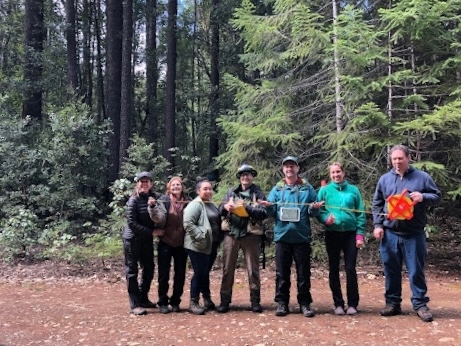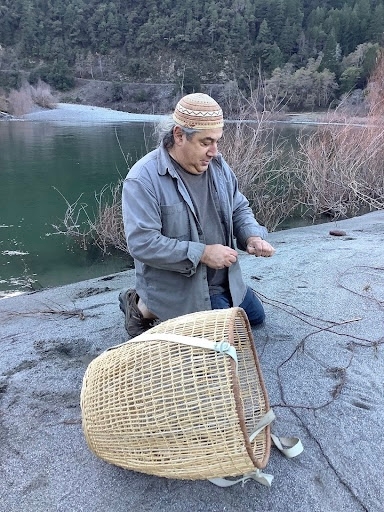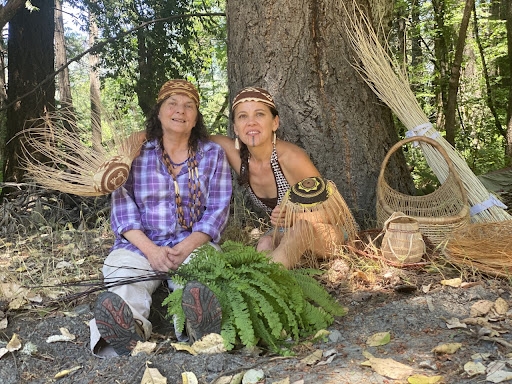UC Berkeley and Karuk Tribe use Indigenous and western science to cultivate resilient food systems under changing climate conditions.
To adapt to climate change, Karuk Tribe members identified the importance of monitoring climate stress on plant species and actively managing and restoring healthy ecosystem processes to increase the consistency and quality of their food harvests, according to a new report. The Karuk Tribe's Aboriginal Territory encompasses over a million acres in the Klamath Basin in Northern California and Southern Oregon.
The Karuk Tribe-UC Berkeley Collaborative has released findings from its four-year collaborative research in their report “Karuk Agroecosystem Resilience and Cultural Foods and Fibers Revitalization Initiative: xúus nu'éethti – we are caring for it.”
To assess climate-change impacts on cultural-use plants and their habitats and to develop strategies and tools for long-term monitoring, this project integrated Indigenous and western science perspectives.
“Understanding the breadth and intensity of climate change with regard to our cultural resources is key to developing adequate response plans,” said Karuk cultural practitioner and project co-lead Lisa Morehead-Hillman. “Without healthy stands (of trees), our cultural practices suffer. We all suffer.”
The report authors lay out specific place-based management and monitoring actions that will enhance the resilience of cultural focal species and habitats to climate change, climate variability and management threats.
To support the resilience of Indigenous cultural agroecosystems and cultural food and fiber species, as well as strengthening Indigenous food sovereignty now and into the future, the authors recommend the following management, policy, research and institutional actions:
• Supporting Karuk Tribal natural resource, data and knowledge sovereignty through appropriate engagement and Tribal oversight.
• Investing in Tribal management infrastructure and workforce development to support culturally appropriate, place-based job opportunities for Tribal members and descendants.
• Supporting co-management and family-based stewardship of cultural use plants and habitats on Karuk Aboriginal lands.
• Investing in and supporting the re-acquisition of Karuk Aboriginal lands to build back the Tribal land base and restore habitats and ecosystems.
• Funding research, monitoring, and educational opportunities that can support youth leadership development, job creation, agroecosystem resilience, and food sovereignty in Karuk Aboriginal Territory.
This research builds on the findings from a five-year Karuk Tribe-UC Berkeley Collaborative food security project (2012-2018), which found that 92% of all Tribal households in the Klamath River Basin experienced some level of food insecurity, and that having access to cultural foods was a strong predictor of food security, yet only 7% of all Tribal households had access to good quality cultural foods at all times.
“This project applies what we learned from tribal members about food insecurity and climate and land management threats to cultural foods to the landscape level, co-creating methods and tools with our Karuk colleagues to assess and restore the health, quality and abundance of cultural foods and fibers to promote food security and eco-cultural resilience,” said Jennifer Sowerwine, lead UC Berkeley collaborator and associate professor of Cooperative Extension.
Research objectives centered around the “Agroecosystem Condition Assessment,” in which UC Berkeley and Karuk researchers and cultural practitioners assessed the health, quality and yield of 20 cultural-use focal plants prioritized by the Karuk Tribe, such as tanoak acorns, evergreen huckleberry, bear grass and hazel, as well as the condition of their habitats.
“This project demonstrates the benefits of working with a diverse research partnership in the co-production of climate science using blended Indigenous and Western research and monitoring methods,” said project collaborator Frank Lake, research ecologist and USDA Forest Service Pacific Southwest tribal liaison. “This project exemplifies recent federal directives and initiatives to support tribes for climate adaptation, forest restoration and eco-cultural revitalization.”
The overall quality and condition of most of the focal species found in the research plots and patches reflect both the devastating impact of colonial land-management practices – including timber harvest, fire exclusion and mining – as well as clear evidence of climate stress such as aborted fruit, early die back and poor-quality product. Forced exclusion of cultural management is reflected in encroachment of invasive species, inappropriate canopy cover and poor-quality harvests impacting both human and animal access to these important plant resources.
“This work done among Indigenous knowledge holders and academia is paramount to developing and sustaining a well-trained workforce for the future,” said Bill Tripp, director of the Karuk Tribe Department of Natural Resources and project co-lead. “We have a long way to go in realizing cultural relevancy in addressing the systemic injustices that plague our people, accelerate climate change, and work against ecosystem process and function.”
Based on research findings informed by the deep insights of Karuk natural resources managers, Karuk elders and cultural practitioners, the report outlines recommendations for restoring key habitats and revitalizing culturally significant species to enhance agroecological resilience in Karuk Aboriginal lands, which are concurrently administered, managed and occupied by U.S. Forest Service and private landowners.
Kathy McCovey, a Karuk cultural practitioner, archaeologist, forest ecologist and project collaborator, explained the cultural significance of the project:
“Through this project, we are learning how to reconnect with place,” McCovey said. “In learning about and tending these areas, we are tending our family gardens. It's all about people in place. Working on this project, we are working to bring these places back to life. We're rediscovering their Karuk names and how those names signal traditional uses of plants in those places. That way we can reconnect with the places our families come from”.
“The whole river system is full of knowledge,” she elaborated. “It's a crucial time for the Karuk people to tend these areas and learn how to take care of them. This community has knowledge that's developed and evolved with these lands and we have a responsibility to support the plants in these areas. We had our land stolen out from under us, but we still live here, we still know how to tend and gather plants, we still have our knowledge and our ceremonies. We still have the ability to go out and gather from the land. We still know how to take care of this place. We take care of the land and it takes care of us.”
This project serves as an example of how university and federal agency researchers can partner with California tribes to lift up Indigenous knowledge, which can help all involved to better understand and develop solutions to the climate crisis and its effects on California's landscapes and biodiversity, especially on species of cultural significance to Indigenous communities.
Funding for the project was provided by a grant from the USDA NIFA Agriculture and Food Research Initiative Resilient Agroecosystems under Changing Climate Challenge Area.
Download the free report at the Karuk-Berkeley Collaborative website: https://nature.berkeley.edu/karuk-collaborative/wp-content/uploads/2023/03/Karuk-Resilience-Report_Smallest-file-size.pdf


